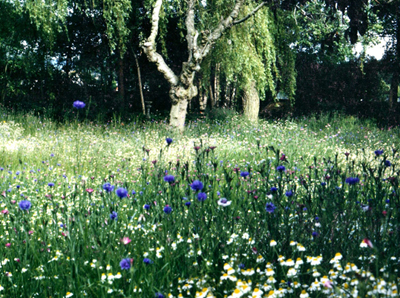Create your perfect garden
Top tips on hiring garden designers, garden consultants, arboriculturists and tools for getting your garden just the way you want to have it this year


There comes a time in the life of every garden when in-house expertise or onsite equipment is just not up to the job. When a gardener or garden owner is out of their depth or comfort zone, it pays to call in temporary, specialist help. But who are the experts and how does one find them? Perhaps the most obvious are garden consultants, who will visit your garden and can be expected to advise on anything and everything, from design and restoration to hard and soft landscape construction, healthand- safety legislation, staffing and staff training.
A consultant may be asked to come for a single visit or as part of a longer-term commitment. Members of Senior Garden Advisors (www.gardenexpert.com/Senior-Garden-Consultants.html), an association of current and former head gardeners from some of the country's finest gardens, are experts with a lifetime of experience in garden improvement, design, restoration, planning and planting, as well as staff acquisition, training and development.
Garden designers are more specialised; they do exactly as their name suggests, and they can be useful in bringing a fresh eye to your property, helping you to make the most of its assets, but adding that missing wow factor. It's important, however, that designers work closely with whoever will be left to maintain their design, and that they pay close attention to the constraints of the site, whether that be maintenance levels, staffing ability or planning regulations.
A garden designer should be willing to visit to discuss your requirements, giving an initial idea of costs. The internet can be useful here-simply Google ‘garden design' together with the county in which you live, and see who comes up. Alternatively, the Society of Garden Designers keeps an approved list on its website (www.sgd.org.uk). Word of mouth can be invaluable, and you should be able to talk to previous clients or see examples of the designer's work before committing yourself.
The majority of queries I get from garden owners are about trees-are they too close to the house? A danger to visitors? Overhanging neighbouring property? The safest solution is to consult a qualified arboriculturist, who can carry out branch removal, crown reduction, felling, pollarding, crown lifting, hedge reduction and much more. They have specialist equipment for grinding out unsightly stumps, for felling trees in sections to prevent damage to property, for chipping brush and for detecting unseen rot or other problems within a trunk or branch. Look for an Arboricultural Association Approved Contactor or Registered Consultant to be sure of a good service; consult the list on www. trees.org.uk.
Other craftsmen who can provide invaluable help include dry-stone wallers, hedge-layers, specialist pruners and topiarists. There are ecologists who will advise on wildflowers and wildlife, garden historians who will document the history of your garden and planning consultants who will help you to navigate building and planning regulations. Any professionally qualified gardener should be able to advise on plant health; alternatively, membership of the RHS is open to everyone, and its Members Advisory Service can provide help with soil analysis, plant and pest identification (www. rhs.org.uk/Gardening/Helpadvice/ RHS-Advisory-Service).

* Country Life New Year subscription sale
Sign up for the Country Life Newsletter
Exquisite houses, the beauty of Nature, and how to get the most from your life, straight to your inbox.
For moral support, it's hard to beat the Professional Gardeners Guild, whose members are in touch with about 1,000 others in similar situations to their own; they can discuss problems and share solutions, glean ideas and visit other private gardens in search of inspiration. Working gardeners can be full or associate members depending on experience, and garden owners can also join as affiliate members; visit www.pgg.org.uk for more details. The employment agency English Country Gardeners (www.englishcountrygardeners. co.uk) has started a Garden Services Directory, where you can find a range of professionals advertising their services, including consultants, designers, landscapers, professional gardeners, tree surgeons and water-garden specialists.
If you have the manpower and the knowledge, but lack the equipment, hiring is often more cost-effective than buying. The internet or Yellow Pages will reveal a tool-hire specialist near you, with a selection of labour-saving devices, including chippers and shredders, turf-cutters, power scythes and flail mowers, sprayers, all manner of lawncare machinery, ladders, minidiggers and even flame guns (tempting!). A reputable company, such as HSS (www.hss.com) or Mammoth (www.mammoth-hire.co.uk) should supply data and all the protective clothing needed to use the equipment safely.
* Buy a wide range of plants for your garden at the brilliant Country Life Nursery
* Image from www.gardenbuilders.co.uk
* Follow Country Life magazine on Twitter
Country Life is unlike any other magazine: the only glossy weekly on the newsstand and the only magazine that has been guest-edited by HRH The King not once, but twice. It is a celebration of modern rural life and all its diverse joys and pleasures — that was first published in Queen Victoria's Diamond Jubilee year. Our eclectic mixture of witty and informative content — from the most up-to-date property news and commentary and a coveted glimpse inside some of the UK's best houses and gardens, to gardening, the arts and interior design, written by experts in their field — still cannot be found in print or online, anywhere else.
-
 Athena: We need to get serious about saving our museums
Athena: We need to get serious about saving our museumsThe government announced that museums ‘can now apply for £20 million of funding to invest in their future’ last week. But will this be enough?
By Country Life
-
 Six rural properties with space, charm and endless views, as seen in Country Life
Six rural properties with space, charm and endless views, as seen in Country LifeWe take a look at some of the best houses to come to the market via Country Life in the past week.
By Toby Keel